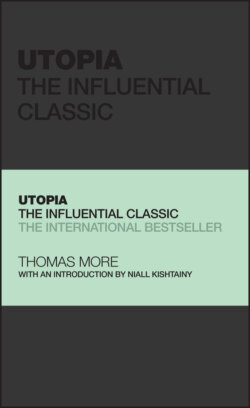Читать книгу Utopia - Sir Thomas More, Thomas More, William Roper - Страница 10
UTOPIA AND THE REAL WORLD
ОглавлениеUtopia is divided into two books. Book One begins with the fictional More's meeting with Raphael, then leads into a series of dialogues between Raphael, More, and Giles. Raphael's recollections of conversations that he had while visiting England introduce a number of other characters. These first conversations are not about Utopia directly, the topic of the island appearing almost as an aside.
On hearing Raphael's descriptions of the different societies that he saw during his travels, Giles says that Raphael should become an adviser to a king, where his knowledge could be put to good use. But Raphael says that courts are places of flattery and rigid convention where the ideas of visionary philosophers are misunderstood and ignored. Much of the rest of Book One is a tug of war between Raphael on one side and More and Giles on the other, the latter two pressing the case for public service on the unshakeable Raphael.
During this discussion Raphael reports a conversation that he had in England that shows the futility of serving kings. At a dinner, a lawyer had praised the harsh punishment given to thieves. Raphael replied that such punishments were pointless and wrong because in an unjust society the poor had to steal to survive. Then comes a famous passage in which Raphael identifies another cause of theft: sheep, which in their grazing swallow up people and whole villages. Raphael is condemning the enclosure of land then underway in England in which agricultural common lands were fenced off and turned over to the raising of sheep for the lucrative wool trade. As a result, farming communities were thrown off the fields and into poverty. The lawyer rejects Raphael's argument for less severe punishments, claiming that they would threaten public order. The other guests agree with the lawyer, but when the distinguished master of the house says that Raphael's argument may have merit, they quickly do an about‐turn. This, says Raphael, illustrates his point that courts are filled with sycophants who simply parrot what they think their masters want to hear.
How do Books One and Two relate to each other? Book Two in narrative terms is the less complex, consisting mainly of Raphael's description of Utopia. More actually wrote this book first. Book One is a swirl of voices, in turn quizzical, curious, and disputatious, that together probe questions of practical politics and statecraft seemingly removed from the grand social vision of Book Two. It is telling that More began Book Two while on a sojourn away from his usual London life and turned to Book One when back in the city and immersed again in his legal and official duties. Book One frames Book Two by exploring how radical solutions can be made into reality. Can we hope for utopia in a world of imperfect politics?
This question has lain at the heart of utopian debates ever since, echoed in the argument between Raphael, More, and Giles about where visionaries should employ their talents. To maintain their ideological integrity, many utopians have since followed Raphael in wishing to stay aloof from the grubby, compromised world of politics.
At the end of Book One, the fictional More sets out a middle way. Raphael's social visions are speculative and abstract and hard to fathom for most people, says More. In the court of a king they would fall on deaf ears if expounded without taking proper account of the context. The problem is that such abstract philosophy lacks sensitivity to its setting and its audience – to the stage on which political life is played out. More instead advocates a philosophy that is tailored to the audience, one pursued by the wise visionary who realizes that though politics is imperfect there is no reason to stay aloof from it. Through tact and judgement one may manage things ‘so that, if you are not able to make them go well, they may be as little ill as possible’.
